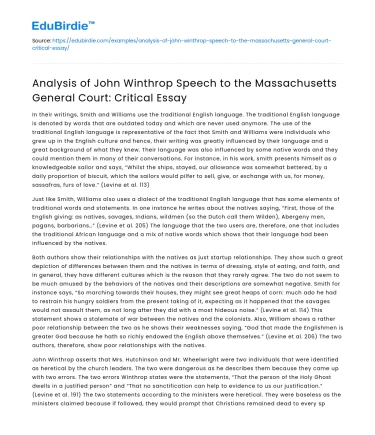In their writings, Smith and Williams use the traditional English language. The traditional English language is denoted by words that are outdated today and which are never used anymore. The use of the traditional English language is representative of the fact that Smith and Williams were individuals who grew up in the English culture and hence, their writing was greatly influenced by their language and a great background of what they knew. Their language was also influenced by some native words and they could mention them in many of their conversations. For instance, in his work, smith presents himself as a knowledgeable sailor and says, “Whilst the ships, stayed, our allowance was somewhat bettered, by a daily proportion of biscuit, which the sailors would pilfer to sell, give, or exchange with us, for money, sassafras, furs of love.” (Levine et al. 113)
Just like Smith, Williams also uses a dialect of the traditional English language that has some elements of traditional words and statements. In one instance he writes about the natives saying, “First, those of the English giving: as natives, savages, Indians, wildmen (so the Dutch call them Wilden), Abergeny men, pagans, barbarians…” (Levine et al. 205) The language that the two users are, therefore, one that includes the traditional African language and a mix of native words which shows that their language had been influenced by the natives.
Both authors show their relationships with the natives as just startup relationships. They show such a great depiction of differences between them and the natives in terms of dressing, style of eating, and faith, and in general, they have different cultures which is the reason that they rarely agree. The two do not seem to be much amused by the behaviors of the natives and their descriptions are somewhat negative. Smith for instance says, “So marching towards their houses, they might see great heaps of corn: much ado he had to restrain his hungry soldiers from the present taking of it, expecting as it happened that the savages would not assault them, as not long after they did with a most hideous noise.” (Levine et al. 114) This statement shows a stalemate of war between the natives and the colonists. Also, William shows a rather poor relationship between the two as he shows their weaknesses saying, “God that made the Englishmen is greater God because he hath so richly endowed the English above themselves.” (Levine et al. 206) The two authors, therefore, show poor relationships with the natives.
John Winthrop asserts that Mrs. Hutchinson and Mr. Wheelwright were two individuals that were identified as heretical by the church leaders. The two were dangerous as he describes them because they came up with two errors. The two errors Winthrop states were the statements, “That the person of the Holy Ghost dwells in a justified person” and “That no sanctification can help to evidence to us our justification.” (Levine et al. 191) The two statements according to the ministers were heretical. They were baseless as the ministers claimed because if followed, they would prompt that Christians remained dead to every spiritual action and that they would not express any graces and would only remain as hypocrites. This outlook according to the church leaders was heretical and it was unacceptable for the church to take their direction. Based on the decision of the leaders, Mrs. Hutchinson and Mr. Wheelwright were being used by the devil.
For the two, John Winthrop justifies their religious deviance. As he presents them, the two were individuals who had instrumental deviance against the religion in which they claimed to believe. Mr. Wheelwright was an individual who had been a silenced minister in England. He had been silenced in England because of his religious misinterpretation. Because he was not able to interpret the religious teachings as he was supposed to, he had been silenced in England and had only found a voice in the new colony. On the other edge, Mrs. Hutchinson was faced with more instrumental charges (Levine et al. 192). Some of the charges that faced her were among others, keeping her two public lectures every week in her house which attracted sixty to eighty people. She was also accused of preaching a covenant of free grace without the seal of the spirit. Therefore, based on their charges and records, Mrs. Hutchinson and Mr. Wheelwright have dissipated religious deviance.






 Stuck on your essay?
Stuck on your essay?

